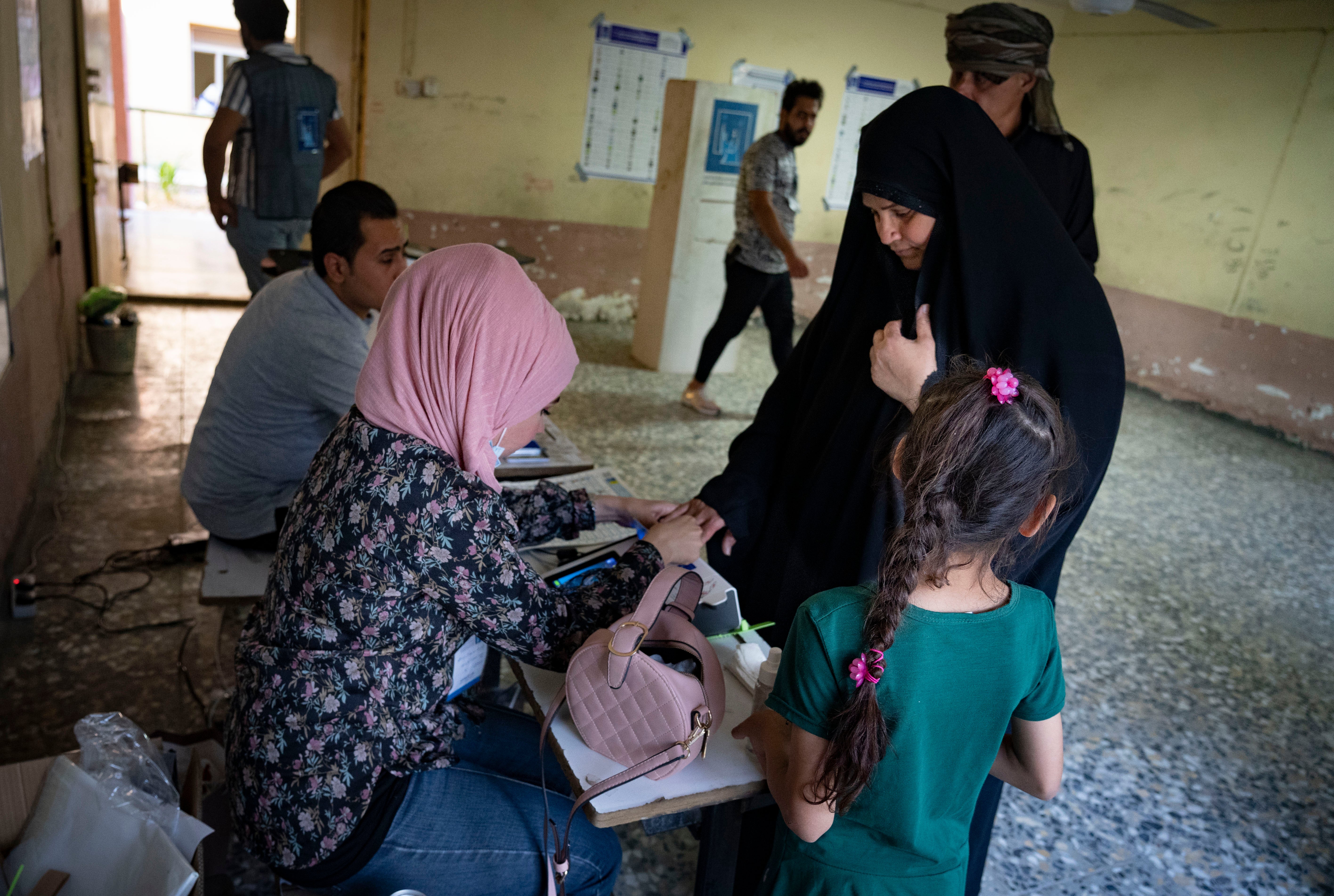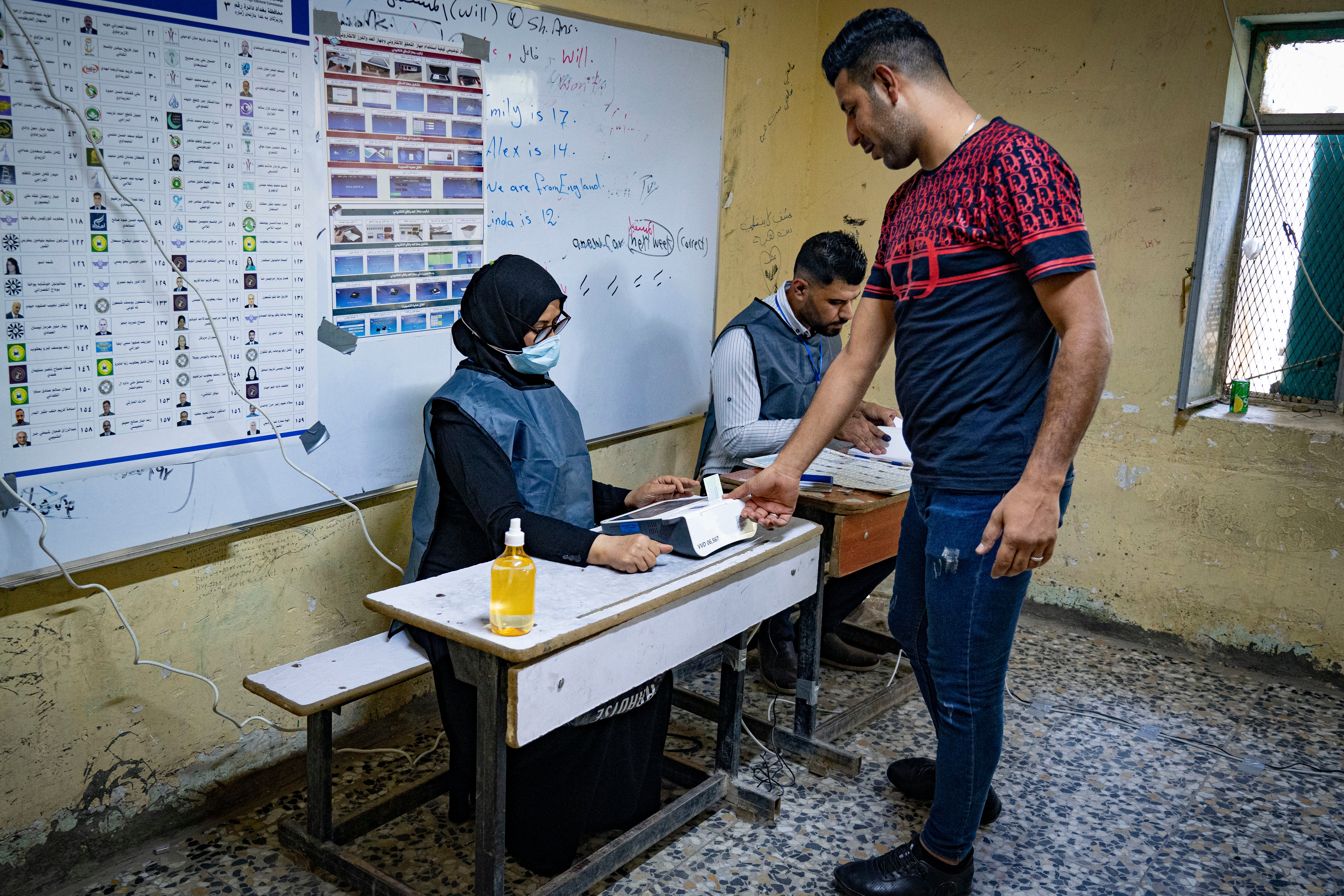‘The country is broken’: Iraq election marred by fears of no change and boycotts
A total of 3,449 candidates are vying for 329 parliamentary seats in Iraq

Across Baghdad’s polling stations, and the country’s bitter divides, one refrain united voters on Sunday: our ballots won’t bring change.
As the streets bristled with 100s of 1000s of security personnel, Iraqis voted in the fifth national election since Saddam Hussein was toppled after the US-led invasion of 2003.
Some 3,449 candidates are vying for 329 parliamentary seats in the polls which are being held several months early: a key demand of a popular uprising that erupted a few years ago against rampant corruption and a crumbling state.
But despite this, there were concerns that voter apathy and despair, as well as a boisterous protest boycott, could drive a record low turnout.
“Iraq is marching towards collapse and we have no future,’” Wessam Nathdam, 42 tells The Independent after reluctantly voting for the Sadrist movement, Iraq’s largest political party and the favourite to win.
“The country is broken, its ethics, education system, infrastructure, judiciary, all of it broken.
“No party can bring about positive change.”
Similar words were repeated across the city in the eastern district of Sadr City, Baghdad’s poorest district and the target of a deadly Isis-claimed suicide bombing in July.
There Jassim Mohamed, 41 a part-time construction worker says he nearly did not vote but ultimately decided for the first time in this voting life to opt for an independent candidate.
“We know the poor will keep suffering, the electricity, infrastructure, services will stay the same, whether I vote or not,” he says.
“But if I don’t come here today someone else will take my vote. And so at least I’m going for a new face.”
Iraq’s elections have been heralded by Iraq’s prime minister as “the country’s opportunity for reform”. And so Mustafa Kadhimi, whose chance of a second term will be determined by the results of the polls, urged the population to "change your reality for the sake of Iraq and your future”. He repeated the phrase “get out and vote” three times as he cast his ballot in the heavily fortified Green Zone.
He agreed to hold the polls seven months early after bowing to demands by Iraq’s Tishreen protests, which since October 2019 has seen tens of thousands of people take to the streets against endemic corruption, crumbling infrastructure, soaring unemployment and the increasing proliferation of armed groups.
They were met with ferocious force: at least 600 protesters and members of the security forces were killed over a few months, and thousands were injured.

As anger swelled Mr Kadhimi also agreed to change Iraq’s elections laws. The legislation breaks the country up into 83 smaller constituencies, bars united lists and lowers the age and education level of candidates, a move which potentially opens the door for independents from a wider range of backgrounds.
But despite these changes, most people do not see hope in Iraq’s future.
“The politicians promise so much change but in reality, it is getting worse every year,” says Fatima Karim, 55 after voting for the pro-Iranian Fatah Alliance - which is mainly made up of parties affiliated with Shia militias in the Popular Mobilisation Forces.
Across town Arsal Yasir, 40 who was voting for a new activist-led party calling Imtiadad adds: “I hope my vote will not let me down but I think ultimately it will.”
The 2018 elections saw just 44 percent of eligible voters cast their ballots, a record low, and the results were widely contested. There are concerns of a similar or even lower turnout this time, particularly as election commission officials told Reuters turnout was only 19 percent by midday.
There were also worries about teething problems with the new biometrics system Iraq has deployed for the vote: The Independent witnessed several people unable to cast their ballot as the systems’ scanners would not recognise their fingerprints.
The country is broken. No party can bring about real change
Internally displaced Iraqis told The Independent meanwhile that many of them were not able to cast their ballots because of issues with their identification cards and getting transport to the polling stations which were not set up in the camps. According to the UN there are nearly 1.2 million IDPs in the country.
Ultimately the vote is expected to be a tight race between the country’s most powerful old guard, which is dominated by Iraq's majority Shiite Muslims: echoing the outcome of a few years ago.
Iraq's influential Shiite cleric Moqtada al-Sadr, is expected to sweep the most votes followed by Fatah Alliance, which serves as a political umbrella for mostly pro-Iran state-sanctioned militias, which came in second in the previous election.
The Kurds, meanwhile, have two main parties that rule the autonomous Kurdistan region, and Sunnis this time have two main blocs.
Initial results are expected on Monday but final turnout figures could be announced on Sunday night.
But there may be a sprinkling of new faces as the new elections law has allowed independents to run and new smaller parties to blossom.
“I am voting for an independent from my neighbourhood who has never been involved in politics before, and I hope that will make a difference,” says Adnan Hussein, 46 from Sadr City who adds he is fed up with nepotism encouraged by the larger political parties.
“All we can be is optimistic. Maybe new faces could be one step on the long road to change.”
Join our commenting forum
Join thought-provoking conversations, follow other Independent readers and see their replies
Comments



Bookmark popover
Removed from bookmarks